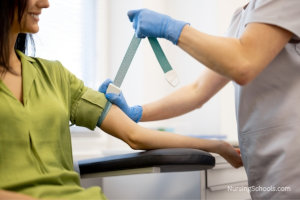Infection Control Nurse
Healthcare Career Guide

Overview
What is an Infection Control Nurse?
An Infection Control Nurse is a specialized healthcare professional responsible for preventing and controlling the spread of infectious diseases within healthcare facilities. These nurses develop and implement infection prevention protocols, educate staff, and monitor outbreaks to ensure patient and staff safety. They play a critical role in maintaining a safe environment in hospitals, long-term care facilities, and other healthcare settings.
Infection Control Nurses work to identify potential sources of infection, such as contaminated equipment, improper hand hygiene, or lapses in sterilization techniques. They often collaborate with multidisciplinary teams, including physicians, administrators, and public health officials, to manage infection risks and respond to outbreaks effectively.
This role is essential in safeguarding public health and reducing healthcare-associated infections (HAIs), making it a vital specialty in the nursing profession.
Education
How Do I Become an Infection Control Nurse?
Becoming an Infection Control Nurse requires education, experience, and specialized training in infection prevention and control. Here are the steps to pursue this healthcare career:
- Earn a Nursing Degree. Complete an Associate Degree in Nursing (ADN) or Bachelor of Science in Nursing (BSN). A BSN is often preferred for leadership roles in infection control.
- Pass the NCLEX-RN. Obtain your nursing license by passing the National Council Licensure Examination for Registered Nurses (NCLEX-RN).
- Gain Clinical Experience. Work in a healthcare setting, such as a hospital or surgical unit, to develop a strong foundation in patient care and infection prevention practices.
- Pursue Certification. Obtain the Certification in Infection Control (CIC) from the Certification Board of Infection Control and Epidemiology (CBIC) to demonstrate expertise in the field.
- Participate in Continuing Education. Stay updated on the latest infection prevention strategies and regulatory requirements through workshops, seminars, or additional coursework.
On average, it takes 4-6 years to become an Infection Control Nurse, including nursing school, licensure, and gaining relevant experience. Certification can further enhance your qualifications and career prospects.

Average Salary
How Much Does an Infection Control Nurse Make?
Salaries for Infection Control Nurses vary based on factors such as location, experience, and certifications. On average, an Infection Control Nurse can expect to earn between $70,000 and $100,000 annually.
Average annual salary for an Infection Control Nurse:
- Entry-level: $70,000 - $80,000 per year.
- Mid-career: $80,000 - $90,000 per year.
- Experienced: $90,000 - $100,000 per year.
According to the U.S. Department of Labor, Infection Control Nurses earn an average hourly wage of approximately $36.00 per hour. Assuming a 40-hour workweek, this equates to an annual salary of $74,880. The lowest 10% earn less than $30.00 per hour, while the highest 10% earn more than $44.00 per hour, resulting in an annual salary range of $62,400 to $91,520 per year.
Job Duties
What Does an Infection Control Nurse Do?
Infection Control Nurses have a range of responsibilities focused on preventing and managing the spread of infectious diseases within healthcare facilities. Their work involves education, protocol development, and monitoring compliance with infection prevention standards.
The most common job duties of an Infection Control Nurse:
- Developing Infection Prevention Protocols. Create and update guidelines to minimize infection risks in healthcare settings.
- Conducting Surveillance. Monitor infection trends, identify outbreaks, and analyze data to recommend corrective actions.
- Educating Healthcare Staff. Provide training on proper hand hygiene, sterilization techniques, and other infection prevention practices.
- Investigating Outbreaks. Identify the source of infections and implement measures to control and prevent further spread.
- Ensuring Regulatory Compliance. Ensure that the facility meets local, state, and federal infection control standards and guidelines.
- Collaborating with Multidisciplinary Teams. Work with physicians, administrators, and public health officials to implement infection control strategies.
- Documenting and Reporting. Maintain detailed records of infection rates, interventions, and outcomes for internal use and regulatory reporting.
Infection Control Nurses typically work in hospitals, long-term care facilities, missionary, or public health agencies. Their role requires attention to detail, critical thinking, and strong communication skills to ensure effective infection prevention and control.

Essential Skills
What Skills Does an Infection Control Nurse Need?
Infection Control Nurses require a combination of technical knowledge, analytical skills, and the ability to educate and influence others. These skills enable them to implement effective infection prevention strategies and improve patient safety.
Here are some of the skills an Infection Control Nurse needs to succeed:
- Critical Thinking. Analyze infection trends and recommend evidence-based interventions.
- Attention to Detail. Ensure compliance with infection prevention protocols and identify potential risks.
- Communication. Clearly explain guidelines and educate staff on infection control measures.
- Leadership. Motivate and influence healthcare teams to prioritize infection prevention practices.
- Data Analysis. Interpret surveillance data to track infection trends and evaluate the effectiveness of interventions.
- Problem-Solving. Address challenges such as equipment shortages or noncompliance with protocols.
- Regulatory Knowledge. Stay informed about infection control standards and requirements from agencies like the CDC and OSHA.
- Adaptability. Respond quickly to emerging threats, such as new pathogens or disease outbreaks.
One of the greatest challenges for Infection Control Nurses is managing compliance with protocols across diverse teams. However, the rewards include improving patient outcomes and reducing healthcare-associated infections, making this role highly impactful.
Last updated: January 31, 2025
References:
- Registered Nurses. Bureau of Labor Statistics, U.S. Department of Labor. Occupational Outlook Handbook. Retrieved January 31, 2025.
- Infection Control Nurse Salaries. Glassdoor, Community Driven Career Data. Retrieved January 31, 2025.
- Become an Infection Control Nurse. Johnson & Johnson, Nursing Careers. Retrieved January 31, 2025.
- Nursing Careers: Getting Started. American Nurses Association, Career Profile. Retrieved January 31, 2025.
- The role of an infection prevention and control nurse. Jan West, PubMed Central. Retrieved January 31, 2025.
- What Is an Infection Control Nurse. Maryville University, Career Profile. Retrieved January 31, 2025.
- Infection Prevention & Control in Nursing. American Nurses Association, Health and Safety. Retrieved January 31, 2025.
- Certification in Infection Prevention and Control. Association for Professionals in Infection Control and Epidemiology. Retrieved January 31, 2025.


